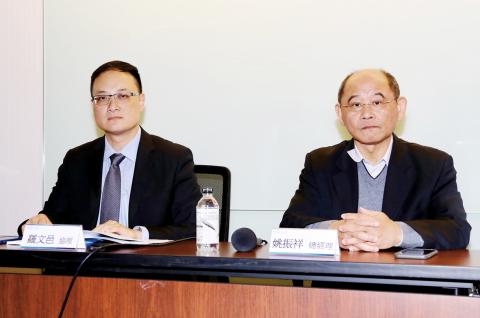Yulon Motor Co (裕隆) yesterday posted deeper quarterly losses of NT$1.57 billion (US$51.46 million) last quarter, as mounting economic uncertainty worldwide pared car sales, while assets impairment worsened.
Last quarter’s losses widened from NT$1.19 billion in the second quarter and a net profit of NT$238.52 million in the third quarter last year, the automaker’s financial statement showed.
Yulon attributed the deterioration to higher impairment losses from its own-brand car manufacturing arm Luxgen Motor Co (納智捷), and losses from an overhaul to a residential-commercial complex development project in New Taipei City’s Sindian District (新店).

Photo: CNA
Aggregate losses in the first three quarters of this year totaled NT$2.36 billion, compared with a net profit of NT$1.12 billion in the same period last year.
Losses per share were NT$1.7 in the first three quarters, compared with earnings per share of NT$1.11 a year earlier.
The Miaoli-based company said it had booked NT$4.5 billion in impairment losses as of Sept. 30 and expects to book more as the value of its automotive molds continue to depreciate, putting the firm at risk of posting full-year losses for the first time in 24 years.
A 10,700 drop in vehicle sales in Taiwan and China contributed to a 4 percent annual decline in revenue to NT$62.83 billion in the first three quarters of this year, Yulon said in a statement.
The sluggish momentum is forecast to extend into this quarter, Yulon said, as overall vehicle sales in Taiwan are predicted to contract 1.9 percent to 415,000 units this year, down from 423,000 last year, due to diminishing replacement demand as well as economic uncertainty ahead of the presidential elections in Taiwan and the US-China trade dispute, it added.
In China, stricter environmental and emission rules have affected vehicle sales this year, which China Association of Automobile Manufacturers forecasts would dip 7.4 percent annually to 26 million units, the lowest since 2015, Yulon said.
However, Yulon Nissan Motor Co (裕隆日產), its car distributing arm, remained a cash cow, reporting a net profit of NT$1.6 billion for last quarter, more than double its earnings of NT$726.25 million in the same period last year.
Earnings per share climbed to NT$6.59 from NT$4.68.
Its net profit in the first three quarters of the year jumped 29.69 percent to NT$4.98 billion from NT$3.84 billion a year earlier.

SEMICONDUCTORS: The German laser and plasma generator company will expand its local services as its specialized offerings support Taiwan’s semiconductor industries Trumpf SE + Co KG, a global leader in supplying laser technology and plasma generators used in chip production, is expanding its investments in Taiwan in an effort to deeply integrate into the global semiconductor supply chain in the pursuit of growth. The company, headquartered in Ditzingen, Germany, has invested significantly in a newly inaugurated regional technical center for plasma generators in Taoyuan, its latest expansion in Taiwan after being engaged in various industries for more than 25 years. The center, the first of its kind Trumpf built outside Germany, aims to serve customers from Taiwan, Japan, Southeast Asia and South Korea,

Gasoline and diesel prices at domestic fuel stations are to fall NT$0.2 per liter this week, down for a second consecutive week, CPC Corp, Taiwan (台灣中油) and Formosa Petrochemical Corp (台塑石化) announced yesterday. Effective today, gasoline prices at CPC and Formosa stations are to drop to NT$26.4, NT$27.9 and NT$29.9 per liter for 92, 95 and 98-octane unleaded gasoline respectively, the companies said in separate statements. The price of premium diesel is to fall to NT$24.8 per liter at CPC stations and NT$24.6 at Formosa pumps, they said. The price adjustments came even as international crude oil prices rose last week, as traders

SIZE MATTERS: TSMC started phasing out 8-inch wafer production last year, while Samsung is more aggressively retiring 8-inch capacity, TrendForce said Chipmakers are expected to raise prices of 8-inch wafers by up to 20 percent this year on concern over supply constraints as major contract chipmakers Taiwan Semiconductor Manufacturing Co (TSMC, 台積電) and Samsung Electronics Co gradually retire less advanced wafer capacity, TrendForce Corp (集邦科技) said yesterday. It is the first significant across-the-board price hike since a global semiconductor correction in 2023, the Taipei-based market researcher said in a report. Global 8-inch wafer capacity slid 0.3 percent year-on-year last year, although 8-inch wafer prices still hovered at relatively stable levels throughout the year, TrendForce said. The downward trend is expected to continue this year,

Taiwan Semiconductor Manufacturing Co (TSMC, 台積電), which supplies advanced chips to Nvidia Corp and Apple Inc, yesterday reported NT$1.046 trillion (US$33.1 billion) in revenue for last quarter, driven by constantly strong demand for artificial intelligence (AI) chips, falling in the upper end of its forecast. Based on TSMC’s financial guidance, revenue would expand about 22 percent sequentially to the range from US$32.2 billion to US$33.4 billion during the final quarter of 2024, it told investors in October last year. Last year in total, revenue jumped 31.61 percent to NT$3.81 trillion, compared with NT$2.89 trillion generated in the year before, according to